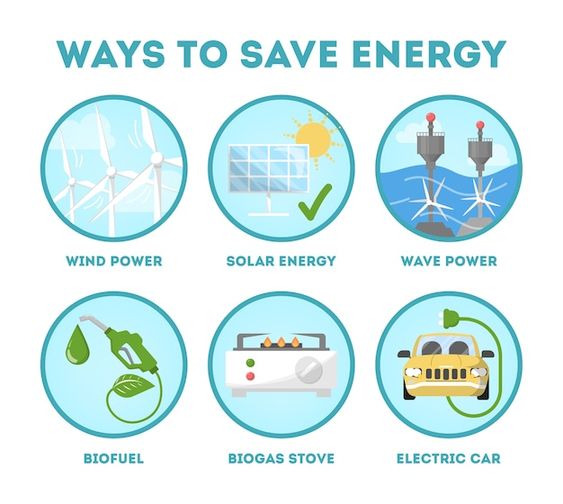Energy efficiency has become a critical focus in modern society, given the increasing concerns about climate change, rising energy costs, and the need to reduce our carbon footprint. Whether in homes, businesses, or industries, improving energy efficiency offers numerous benefits that go beyond just reducing energy consumption. This article explores the importance of energy efficiency and how it contributes to a sustainable future.
What is Energy Efficiency?
Energy efficiency refers to the practice of using less energy to perform the same task. It involves optimizing the use of energy in appliances, buildings, vehicles, and industrial processes, thereby reducing energy waste. The goal is to maximize energy output while minimizing energy input, leading to both economic and environmental benefits.

Why Energy Efficiency is Important
Cost Savings:
One of the most immediate and noticeable benefits of energy efficiency is the reduction in energy costs. By using energy more efficiently, households and businesses can lower their utility bills. Energy-efficient appliances, lighting, and heating and cooling systems often use significantly less energy than their conventional counterparts, leading to substantial savings over time. For businesses, this can translate into improved profitability and competitiveness.
Environmental Protection:
Energy efficiency plays a vital role in mitigating climate change. The burning of fossil fuels for energy is a significant contributor to greenhouse gas emissions, which are driving global warming and environmental degradation. By improving energy efficiency, we can reduce the amount of energy needed, thereby decreasing the demand for fossil fuels and lowering emissions. This contributes to cleaner air, reduced pollution, and a healthier planet.
Energy Security:
Improving energy efficiency helps reduce dependence on foreign energy sources such as oil and gas. By using energy more efficiently, countries can decrease their reliance on imports, improving energy security and reducing vulnerability to geopolitical instability and price fluctuations in the global energy market.
Resource Conservation:
Energy production often requires the use of natural resources such as coal, oil, gas, and water. By improving energy efficiency, we can conserve these valuable resources for future generations. For example, energy-efficient buildings reduce the need for electricity generated by coal or natural gas, which helps preserve finite fossil fuel resources.
Reduced Infrastructure Costs:
Energy efficiency can also reduce the need for new energy infrastructure, such as power plants and transmission lines. As energy demand decreases due to improved efficiency, utilities can avoid costly investments in new infrastructure, which often have environmental and social impacts.
Improved Comfort and Health:
Energy efficiency measures, particularly in homes and buildings, can lead to improved comfort and health. Proper insulation, efficient heating and cooling systems, and better ventilation contribute to more stable indoor temperatures and better air quality. This can lead to healthier living environments and improved well-being, reducing issues like respiratory problems and other health conditions caused by poor indoor air quality.
Job Creation and Economic Growth:
The push toward greater energy efficiency can stimulate economic growth by creating jobs in sectors such as manufacturing, construction, and energy services. The energy efficiency industry requires skilled workers to develop, install, and maintain energy-efficient technologies and systems. As governments and businesses invest in energy efficiency initiatives, they help spur innovation and job creation in these fields.
Resilience to Energy Price Fluctuations:
Energy efficiency helps protect businesses and consumers from the impacts of rising energy prices. As energy becomes more expensive, those who have invested in energy-efficient technologies will be better positioned to weather the changes. This stability is especially valuable for industries that are energy-intensive, as they can better control operating costs and remain competitive.
How to Improve Energy Efficiency
Energy-Efficient Appliances and Lighting:
Investing in energy-efficient appliances, such as refrigerators, washing machines, and HVAC systems, can significantly reduce energy consumption. Switching to LED or other energy-efficient lighting options also helps cut electricity use.
Insulation and Weatherization:
Proper insulation in walls, attics, and floors helps maintain indoor temperatures, reducing the need for heating and cooling. Sealing gaps and cracks in windows and doors (weatherization) further prevents energy loss, enhancing the overall efficiency of a building.
Smart Thermostats and Energy Management Systems:
Smart thermostats and energy management systems allow users to control and optimize their energy use. These systems can automatically adjust settings based on real-time data, ensuring energy is only used when needed.
Energy-Efficient Transportation:
Adopting fuel-efficient vehicles, electric cars, and alternative transportation options such as biking or public transit helps reduce energy use in transportation. Additionally, carpooling and telecommuting can further reduce energy demand.
Renewable Energy Integration:
While renewable energy is not the same as energy efficiency, integrating renewable energy sources such as solar or wind power with energy-efficient practices maximizes energy sustainability. Energy efficiency reduces the overall energy demand, making it easier to meet needs with renewable energy sources.















